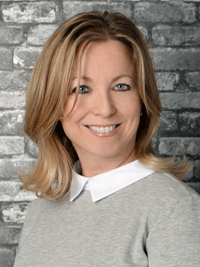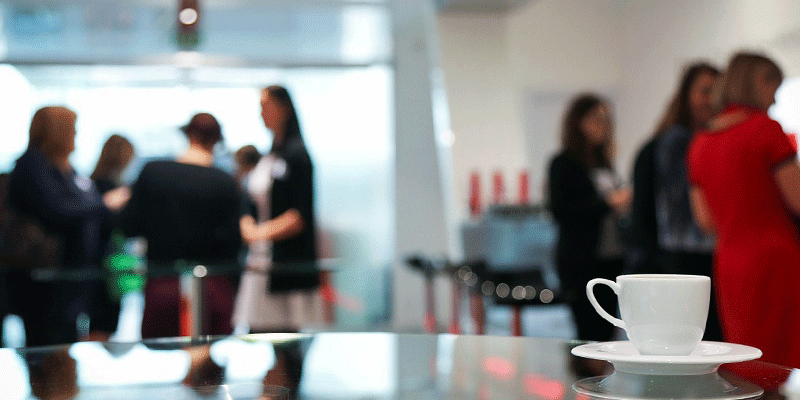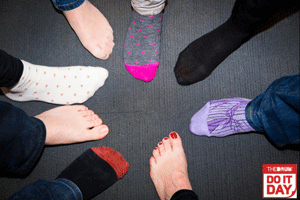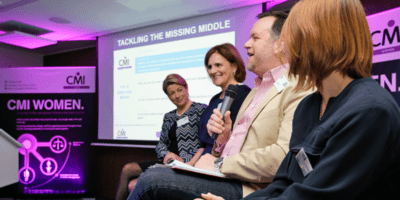Marina Lumley is a founding partner of Greengrass Consulting, whose mission is to help companies drive an energised, positive and productive culture, with gender equality at its heart. Greengrass took part in The Drum’s Do It Day in September 2016 to tackle the challenge of how to engage men in the workplace to actively promote gender equality, and the result was joining with O2 to launch the #walkthetalk campaign. The call to action for #walkthetalk is for men to kick off their shoes, take a snap of their feet and tweet the picture to show their support for gender equality.

“…Over recent months I’ve been to a number of topical events and forums on gender equality, and what was consistent at each event was the absence of men. The room was dominated by women talking about the issues with other women. The majority of the speakers were women, and in fact one male speaker felt the need to ask permission to speak…”
My career in marketing
My career started in the marketing communications sector back in ‘94 and I spent 14 years in marketing agencies and was on the board of an independent agency – Meteorite. I was responsible for the client servicing team which involved people management and career development, as well as client responsibilities.
I then had an eight-year career as an independent marketing consultant and trainer working on strategic marketing projects, where I developed and deployed training programmes for marketers. In that time, I’ve been fortunate to work with many major brands across sectors including automotive, financial services, retail, leisure and hospitality, professional services and FMCG.
Realising that being a woman was not a problem to be fixed
I’ve always known that gender made a difference to how you were perceived in business. I’d witnessed it, and been part of it, but twenty years ago it wasn’t something that was called out – or even discussed. I noticed men who seemed less qualified than women being promoted. I watched assertive men being positively recognised for their directness and the same trait in women being called ‘aggressive’.
I didn’t consider equality / diversity in the way I do now. At the time I thought being a woman was my problem to fix, if I wanted to reach senior positions in companies and also have children. That it was just part of life and the cards I’d been dealt – I didn’t blame anyone for it, men or women – it was the prevailing culture of the company and society at the time.
From my late 20s I was concerned about how I could have a career and a family. There were almost no role models of successful and senior women having children and managing both well, and those that I did observe, seemed to be struggling to justify the dual role to themselves and their employers.
Challenging self-limiting assumptions
One reason why I resisted going back into employment after leaving agency life was because I didn’t know if I could have a family and realise my career ambitions – but was that a limiting assumption of mine? I missed out on those ‘big jobs’ that had been calling out to me. Instead I became my own boss, which gave me the flexibility I needed.
Funnily enough, my daughter didn’t come along for another eight years, when I was 42, so here I am with a three-year-old daughter and co-founder of start-up consultancy, Greengrass, which I founded with my business partner, Libby Child, whom I had worked with for the previous three years in relationship management.
I am extremely excited because this is the beginning of my third career, and I believe it will be the best yet. And I’m able to do it with a young family. It is now possible! Possible because I’ve worked it out in my head, and I know it is. I am no longer my barrier, held back by limiting assumptions.
Culture trumps strategy
We set up Greengrass to help companies create high performance cultures. In a previous consultancy role, where I met Libby, we could see that team success was frequently dependent on the culture of the company. But that culture never seemed to be actively managed-it was just left as being the way things got done. We knew it was way more important. To borrow a well-used quote by Lou Gerstner. “I came to see in my time at IBM that culture isn’t just one aspect of the game – it is the game.”
So Greengrass helps companies pay more attention to the game. We work with a diagnostic tool that measures the strength of a company’s culture and frames its current challenges. Then we work with the business to develop solutions to the problems they decide to tackle.
From my own experience, I knew that gender equality in the workplace was a cultural challenge for businesses. I also knew that mentoring and leadership programmes for women had limited impact where the assumptions and beliefs of that company didn’t support those initiatives – they remained token gestures.
Shining a light on perceptions of gender equality
So Greengrass shines a light on perceptions about gender equality in companies, so the leadership teams can see for themselves how their people “think” the working practices and policies enable (or inhibit) gender equality.
We do this through a carefully designed set of questions which look at current perceptions and behaviours. We can break that down by department, location, seniority etc., and we examine the results alongside the policies and practices the company currently uses to drive equality. This helps companies frame their challenges and give them a benchmark against which to measure their improvement.
Gender equality isn’t just for women
Over recent months I’ve been to a number of topical events and forums on gender equality, and what was consistent at each event was the absence of men. The room was dominated by women talking about the issues with other women. The majority of the speakers were women and in fact one male speaker felt the need to ask permission to speak. “What the hell is going on here?” I thought. “Where are all the men?” and “Why did this confident man suddenly feel he needed to seek permission to be there?” As my daughter would say, “It’s all gone a bit wonky donkey.”
The answer was pretty obvious when I reflected on it. For many men, they didn’t believe it was their issue to get involved in, and for others, they were too frightened to show up in such a female dominated environment. If I were a man, I’m not sure I’d show up. But, the irony is that men are both beneficiaries of gender equality and enablers to helping achieve it.
Conceptualising #walkthetalk
So we wanted to shift the focus of conversation to men. We approached O2 with this thought as we knew they were a progressive business working hard to create a balanced workplace. We jointly took this challenge to The Drum’s Do It Day and the winning team’s idea was #walkthetalk. This involved asking men to take off their shoes and tweet a picture of their feet – because it’s not about the shoes your wear (even if you are Theresa May) but what you stand for. And we wanted those men who support gender equality to stand up for it.
We used the thought to create an identity (#walkthetalk) and a campaign mechanic (tweet your feet) to tell the story in a way that engaged men. We developed a website that gave the facts about the positives for men as well as for women. We created a series of videos and a 40-second ad featuring senior men in organisations explaining why they support gender equality. All the skills and resources were donated by businesses that wanted to support this cause.
We talk about how men gain personally, how the companies they work for benefit, and how their children will be positively impacted. We also talk about how they are enablers for change, because they are still in the majority of decision making roles. If they speak out and act in sufficient numbers, it will make a difference, and these men can help other men – those who don’t recognise that gender bias exists – to do so.
Beyond the women’s network sub-culture: Engaging men in the gender equality debate
Initially, women had to be the champions of the debate. The creation of women’s networks was a good initiative for businesses to adopt – but these networks can operate as sub-cultures, outside of the prevailing culture of the business.
We know why these networks exist, and they can be a force for good, but we want to challenge their title and their composition. Their purpose should be about achieving gender equality for men and women – men helping women and women helping men. Why shouldn’t men be half of the audience and half of the champions?
The topics on the agenda could include:
- How can we as a business recognise when we are acting out an unconscious bias? What do we need to raise awareness of?
- Can we create a cross-gender mentoring scheme so that women mentor men, and men mentor women?
- In our company, how do we enable men to take advantage of flexible working so that they can be active parents / careers and not believe their careers are being penalised as a result?
- How do we create a win / win across the genders?
We support #EqualPayDay Today we’re launching #walkthetalk getting men engaged in gender equality in the work place https://t.co/jacCJoktAi pic.twitter.com/TJxEDa8sbc
— walkthetalk (@walkthetalkinfo) November 10, 2016
How social pressure around balancing work and family affects women and men differently
Talking from personal experience, there is still a prevailing expectation that women have the mandate to balance work / life more than men. I sometimes catch myself moaning about the struggle that this creates for me – I seem to operate at a constant jog, processing my multi-dimensional to-do-list:
- Write that results presentation.
- Organise a play-date for Saturday.
- Run a profiling programme on a leadership team.
- Make a costume with Gabriella for her Christmas play etc.
And ironically, I am a happier for it. I wish men had the same opportunity to experience that.
Take a typical situation where a child is sick and needs to be looked after at home – I may be totally wrong here but in my experience it is more the norm for a woman to say she needs to stay at home and look after her child. If the man phoned in, would it be as acceptable? Certainly in my business career it appeared to fall to women to do that more than men – again the beliefs and assumptions embedded in that culture drove those behaviours.
At this point it is probably worth pointing out that in my personal life I am fortunate that my husband is as likely to take our daughter to nursery and stay home with her when she is sick as I am. We work as a team. Our daughter deserves and benefits from a combination of our attention. We spent some time making sure that one of our careers isn’t perceived as more important than the other’s. We each look at our day and work out who is best placed to ‘give’ in that situation. It works, and we are a stronger couple for it.
#walkthetalk Standing up with my daughter for #genderequality. Don’t want to be the only father at nursery coffee mornings. #Flexibleworking pic.twitter.com/Mr5txr997M
— Solarmark Ltd (@LtdSolarmark) November 10, 2016
Time for men to be brave and speak up about their beliefs
Do a significant proportion of men want to take shared paternity leave / take up flexible working? Have they contemplated it as a real opportunity for themselves? If they have, do they perceive there to be a ‘cost’ to their career? I don’t think enough men are championing it – and I wish they would.
More men need to be brave and speak up about their beliefs in order to influence the culture of the organisation. Those beliefs are an important catalyst. To enable the company to recognise it needs to change its ways of working…
Affecting real change in the gender equality space
This takes me back to the premise of Greengrass. We believe that you have to tackle the beliefs and assumptions at the heart of a business culture in order to effect real change. Companies have to want to enable their people to think and behave differently. To put energy behind actions which will kill off old bad habits, and create new good habits.
Targets of 33% female boards may succeed in being hit, by hiring from outside. This means they could fail in terms of tackling gender equality within that company, by not addressing the beliefs and habits that created a male board in the first place. It will have been a political exercise that ticks the right boxes but misses the mark.
Future plans
For Greengrass, we want to work with more businesses to examine their current culture, and gender equality within it. And then work on the assumptions, beliefs, good and bad habits, in order to create initiatives to tackle the challenges.
#walkthetalk is the start of a long term initiative (we hope) to engage men in the gender equality debate, and provide a balanced and welcoming context for them to explore the topic and become champions for gender equality.
In terms of bringing the focus of the #walkthetalk campaign and Greengrass together, we are looking to pilot workshops in the New Year that will focus on men within businesses – to be a first conversation for many, and to enable men to share their thoughts and feelings. Yes, the F word…
http://greengrassconsulting.com/
https://twitter.com/greengrasstweet
https://twitter.com/marinalumley
https://twitter.com/walkthetalkinfo








